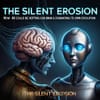The concept of "silent erosion" refers to the potential risks of over-relying on artificial intelligence, particularly in how it might weaken our mental capabilities and autonomy. Frequent AI use has been linked to declining critical thinking abilities, especially among younger users. When AI instantly solves problems, people may struggle to think deeply or develop problem-solving skills.
Over-reliance on AI can also erode our capacity to recognize when we don't know something, question assumptions, or generate novel solutions to unprecedented problems. AI algorithms can create personalized echo chambers, feeding us content that reinforces what we already believe, leading to narrower thinking patterns and intellectual laziness.
From a neuroscientific perspective, when we stop exercising our cognitive muscles, neural networks weaken, much like muscles that atrophy without use. The brain's fundamental principle of efficiency can lead to synaptic pruning, where neural networks that aren't regularly activated weaken.
To mitigate these risks, organizations and individuals can develop deliberate practices to maintain human agency in an AI-augmented world. For example, "manual mode" exercises where employees practice core skills without AI assistance can help preserve critical thinking and creativity. Implementing AI systems that enhance rather than replace human judgment can also help.
Educating the public about the risks of over-reliance on AI can empower individuals to make informed choices about when to rely on technology and when to engage their mental faculties. Emphasizing critical thinking, creativity, and problem-solving skills in schools and universities can also help learners develop intellectual engagement and reduce reliance on AI.
Ultimately, finding a balance between harnessing AI's advantages and safeguarding human intellectual integrity will be crucial to creating a future that values both technological advancement and human capabilities. By being aware of the potential risks of AI over-reliance, we can take steps to preserve human agency, creativity, and critical thinking in an AI-driven world.


